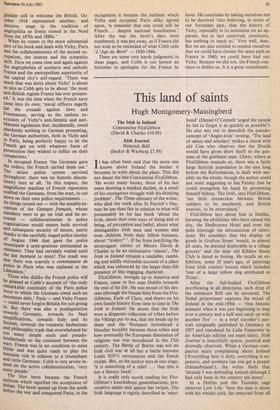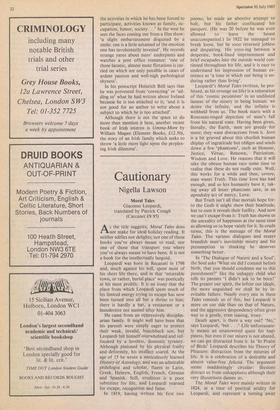This land of saints
Hugh Montgomery-Massingberd
The Irish in Ireland Constantine FitzGibbon (David & Charles £10.95)
' Irish Journal
Heinrich Boll (Seeker & Warburg £7.95)
Tt has often been said that the more one I knows about Ireland the harder it becomes to write about the place. This did not daunt the late Constantine FitzGibbon. 'He wrote many books, those of his last years showing a marked decline, as a result of his courageous struggle with his drinking problem'. The Times obituary of the writer, who died the week after St Patrick's Day, may be less than fair in relation to what will presumably be his last book 'about the Irish, about their own ways of doing and of being, of perception and belief, about what distinguishes Irish men and women and even children from their fellow humans, about "Irishry" '. If far from justifying the extravagant claims of Messrs David & Charles to be an authorative 'classic', The Irish in Ireland remains a readable, rambl- ing and mildly enjoyable account of a place which was enhanced by the larger-than-life presence of this engaging character.
FitzGibbon, brought up in America and France, came to live near Dublin towards the end of his life. He was proud of his des- cent (through the female line) from the Fitz- Gibbons, Earls of Clare, and draws on his own family history from time to time in The Irish in Ireland. He shows that the Irish were a disparate collection of tribes before the Vikings put to sea, that the break-up by them and the Normans introduced a bloodier hostility between those tribes and how eventually the European dimension of religious war was introduced in the 17th century. The Battle of Boyne was not an Irish civil war at all but a battle between Louis XIV's mercenaries and the Dutch troops. But, as the author says at one stage, 'it is something of a relief ... that this is not a history book'.
It is really only worth reading for Fitz- Gibbon's knockabout generalisations, pro- vocative asides and saloon bar swipes. The Irish language is rightly described as `mori-
bund' (Daniel O'Connell 'urged the people he led to forget it as quickly as possible'). He also sets out to demolish the pseudo- concept of 'Anglo-Irish' writing. 'The land of saints and scholars' strikes a chord with old Con who observes that the Druids would have given short shrift to the gun- man or the gombeen man. Ulster, where as FitzGibbon reminds us, there was a fairly large Scottish population in the east long before the Reformation, is dealt with sen- sibly on the whole; though the author could not resist suggesting to Ian Paisley that he could strengthen his hand by promoting himself bishop. The Irish, says FitzGibbon, `see little connection between British soldiers to be murdered, and British tourists, to be entertained.'
FitzGibbon lays about him in Dublin, berating the philistines who have ruined the city, the Shelbourne Hotel and even the pubs (through the introduction of televi- sion). He considers that the display of goods in Grafton Street 'would, in almost all cases, be deemed deplorable in a village grocery' and the dear old Kildare Street Club is slated as boring. He recalls an ex- hibition, some 30 years ago, of paintings from Irish country houses which included 'one of a large yellow dog attributed to Titian'.
After the full-bodied FitzGibbon overflowing in all directions, each drop of the miniature 13011 can be savoured. The Nobel prizewinner captures the mood of Ireland in the mid-1950s — 'that historic moment when it was just beginning to leap over a century and a half and catch up with another five' — in a brief traveller's por- trait (originally published in Germany in 1957 and translated by Leila Vennewitz in an American edition ten years later). Irish Journal is beautifully sparse, poetical and shrewdly observed. When a German com- patriot starts complaining about Ireland ('Everything here is dirty, everything is ex- pensive, and nowhere can you get a proper chateaubriand), the writer finds that `already I was defending Ireland although I had only been in the country ten hours'.
In a Dublin pub the Teutonic sage observes Low Life: 'here the man is alone with his whisky (sic), far removed from all
the activities in which he has been forced to participate, activities known as family, oc- cupation, honor, society...' In the west he sees the faces coming out from a film show: `a slight embarrassment disguised by a smile; one is a little ashamed of the emotion one has involuntarily invested'. He records strange yarns about nuns' underpants and watches a post office romance: 'one of those laconic, almost mute flirtations is car- ried on which are only possible in cases of ardent passion and well-nigh pathological shyness'.
In his postscript Heinrich Boll says that he was prevented from 'correcting' or `ad- ding to' what he had written about Ireland because he is too attached to it; `and it is not good for an author to write about a subject to which he is too attached'.
Although there is not the space to do more than mention it here, another recent book of Irish interest is Umma-More by William Magan (Element Books, £12.50), the story of an Irish family which seeks to throw 'a little more light upon the perplex- ing Irish dilemma'.







































 Previous page
Previous page